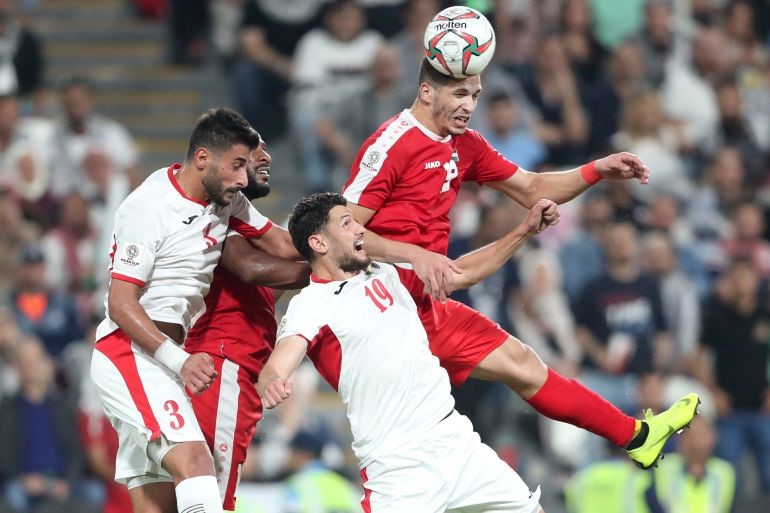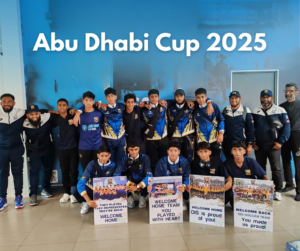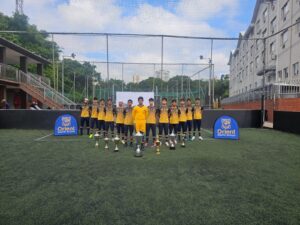
Palestine's Mahmoud Wadi heads for a goal during the AFC Asian Cup, Palestine v Jordan, Group B match at Mohammed Bin Zayed Stadium, Abu Dhabi, on January 15, 2019 [File: Suhaib Salem/Reuters]
By James Montague
For the better part of three months, Rami Hamadi and his teammates have trained together, eaten together, played together and watched the tragedy in Gaza unfold from afar together, too.
“It’s not a good situation for playing or for living because of what is happening to our people in Gaza,” says Hamadi, the goalkeeper of the Palestine national football team. “Our mind is with our people in Palestine because we see every day what’s happening.”
On Sunday, Palestine began its 2024 Asian Cup campaign in Qatar against Iran. (It lost 3-1 to Iran) But preparations for the 23-man squad have been overshadowed by the war in Gaza.
Three weeks after Hamas’s October 7 attack on Israel, the Palestine team left the West Bank overland for Jordan and then to Qatar.
Since then, the squad has stayed together as the conflict has worsened, touching every player, coach and official. “Everyone is glued to the news, before and after training, be it on the bus or at the hotel,” Palestine’s Tunisian coach, Makram Daboub, told AFP during a recent training camp in Saudi Arabia shortly before arriving in Qatar. The players, Daboub said, “have a constant feeling of anxiety for their families”.
With movement in and out of the Gaza Strip impossible, only two players from Gaza are in the squad. Defender Mohammed Saleh and striker Mahmoud Wadi were both only able to join the squad because they play for clubs in Egypt.
Back in 2018, Wadi had been trapped in Gaza after being initially refused permission by Israeli authorities to travel back to the club he was then playing for in the West Bank. He eventually signed with Pyramids FC in Egypt for a record $1.1m, making him Palestine’s most expensive player.
Both men, according to Hamadi, now nervously await news of their families every day. “Saleh sent a message to his family 10 days ago,” says Hamadi. “Only yesterday, they answered him. They’re OK.”
Then, a few days ago, word reached the squad that Hani al-Masdar, a popular former player, coach and general manager of Palestine’s Olympic team, had been killed after his village was bombed. “Saleh, Wadi, the younger players from the Olympic national team knew him very well. They were playing together before the war,” says Hamadi. “Nobody should be in this situation. Nobody in the world!”
Dozens of Palestinian players, coaches and officials have been killed in the Israeli bombardment of Gaza. To date, Shalabi says, at least 71 players have been killed, adding that she believes this is likely to be an underestimate.
“They [FIFA and the AFC] are not doing anything at all,” says Shalabi, who is also a member of the AFC’s executive committee. “These organisations are supposed at the very least to condemn what’s happening now – and let me call it genocide because what’s happening now in Gaza is genocide. They are afraid. But there hasn’t been any real action to send a clear message that these things should not happen.”After playing Iran, one of Asia’s strongest teams, Palestine will play the UAE before a final group game against rank outsiders Hong Kong. Despite everything, there is hope within the team that Palestine could be the “surprise package” of the tournament, with strong home support for every game.
“Look what happened in the World Cup with Morocco,” he says. “No one imagined that Morocco would reach the semifinals like that, ” Shalabi added – Al Jazeera.


